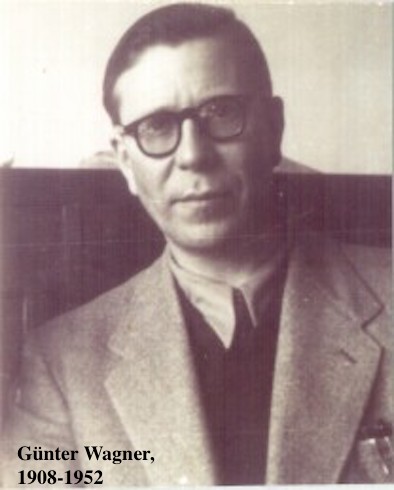
ギュンター・ワーグナー
Günter Wagner, 1908-1952

★ギュンター・ワーグナーはドイツの民族学者、コロンビア大学でフランツ・ボアズの講義を受 け、ハンブルグ大学を卒業。1933年、ワーグナーはロックフェラー財団から奨学金を受け、ロンドンに新しく設立された国際アフリカ研究所の代表としてケ ニアなどで調査後、1940年ごろテュービンゲンのエーベルハルト・カール大学で職に就いた。さらに、第三帝国啓蒙宣伝省に勤務。第二次世界大戦にも参戦 した。1952年に死去。
☆オーストリア生まれの進化生物学者のGünter P. Wagner
(b.1954)とは別人です。
| Günter
Wagner was born in Berlin in 1908, where he spent his childhood and
youth. After finishing school in 1926 he took up his studies of
Anthropology. After brief periods at the universities in Freiburg and
Hamburg, Wagner moved to New York. There he attended lectures by Franz
Boas at the Columbia University. |
1908年、ベルリンに生まれ、幼少期と青年期を過ごす。1926年に
学校を卒業後、人類学を学ぶ。フライブルクとハンブルクの大学に短期間在籍した後、ニューヨークへ移る。コロンビア大学でフランツ・ボアズの講義を受ける。 |
| In
1929 Wagner conducted his first field work, namely among the Yuchi
people in North America. During this research he collected the
ethnographic data used for his Ph D thesis on the Peyote cult. Wagner
subsequently graduated at the University of Hamburg in 1932. |
1929年、ワーグナーは北米のユチ族で最初のフィールドワークを行っ
た。この調査で彼は、ペヨーテ信仰に関する博士論文に使用する民族誌的データを収集した。その後、1932年にハンブルク大学を卒業した。 |
| During
the following years Wagner lectured at several universities in the US,
e.g., in Berkeley and Chicago. Moreover, he did further field
researches, this time among the Comanche. In 1933 Wagner received a
scholarship of the Rockefeller foundation and took up his research work
in Kenya on behalf of the newly founded International
African Institute
located in London. Until 1939 Wagner did several long term researches,
e.g., among the Luhya people. |
そ
の後、ワーグナーは、バークレーやシカゴなどアメリカのいくつかの大学で講義を行った。さらに、今度はコマンチ族を対象にした野外調査も行った。1933
年、ワーグナーはロックフェラー財団から奨学金を受け、ロンドンに新しく設立された国際アフリカ研究所の代表としてケニアで調査を開始した。1939年ま
で、ワーグナーはルヒヤ族などの長期的な調査を行った。 |
| After
his return to Germany, Wagner completed his habilitation thesis in
1940. He subsequently took up a position at the Eberhards-Karl
University in Tübingen. Moreover, Wagner worked for the Third Reich
Ministry of Public Enlightenment and Propaganda. He participated in
World War II. |
ドイツに帰国後、ワーグナーは1940年にハビリテーション論文を完成
させた。その後、テュービンゲンのエーベルハルト・カール大学で職に就いた。さらに、第三帝国啓蒙宣伝省に勤務。第二次世界大戦にも参加した。 |
| At
the end of World War II Wagner was dismissed from his position at the
university in Tübingen. During the following years he mainly did
translational work. In 1950 Wagner became Assistant Government
Ethnologist at the Department of Native Affairs in Southwest-Africa
(now: Namibia). There he conducted field work among the Herero people. |
第二次世界大戦が終わると、ワーグナーはテュービンゲンの大学の職を解
かれた。それからの数年間は、主に翻訳に従事した。1950年、ワーグナーはアフリカ南西部(現在のナミビア)の先住民省の政府民族学者補佐となる。そこ
で彼は、ヘレロの人々の間で実地調査を行った。 |
| Günter Wagner died of pneumonia
in 1952. |
ギュンター・ワーグナーは1952年に肺炎で死去した。 |
| (Text
written by Vincenz Kokot in July 2012, based on Wikipedia and an
obituary by Baumann, Hermann, 1953, ZfE; photo shows Günter Wagner in
Pretoria (1950), by courtesy of Wagners daughter, Gaby von Pape, via
Udo Mischek) |
|
| http://www.germananthropology.com/short-portrait/gnter-wagner/288 |
|
+++
リンク
文献
その他の情報



++
Copyleft,
CC, Mitzub'ixi Quq Chi'j, 1996-2099